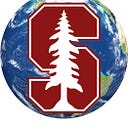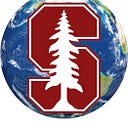How CA community college instructors are expanding global studies across the curriculum
Through a one-year fellowship with Stanford Global Studies, 10 California community college instructors redesigned their course materials and extracurricular programs in innovative ways to strengthen global understanding, awareness, and engagement among their students. Below, you can see how these instructors transformed their offerings — from creating an open source game to foster student engagement to redesigning a more global and inclusive honors program.
Expanding Awareness of African Diaspora Experiences
By Angelo Bummer, English Instructor, Las Positas College
Umoja is a Swahili word that means “unity.” And it’s also translated as “the spirit of togetherness.” It’s this spirit of togetherness that Umoja Community attempts to nurture and provide for its students. Umoja Community is a statewide organization designed to promote the success of African-American students through culturally responsive curriculum and practices. I’ve redesigned my critical thinking and literature course to align with Umoja practices and to explore global themes in an effort to expose students to African diaspora experiences. In this way, I hope to foster empathy, self-awareness, and collective responsibility in our students. To this end, students draw on the works of contemporary black artists and writers from the Americas and across the Atlantic to explore themes of migration and identity, the legacy of colonialism and the experiences of Africans seeking asylum today.
View his powerpoint presentation.
Studying World Literature with a Global Mindset
By Catherine M. Eagan, English Instructor, Las Positas College
A CompLit theory book I like asked the question: How do words and worlds interact? I came face-to-face with that question when I had to teach a world literature course that spanned three centuries. I knew that each author’s words would not open a window into their worlds for students unless students could fill in the gaps in their knowledge with annotation. I also hoped that Lacuna stories with its digital social annotation could help students make connections between these texts, their different contexts and their own words, their own thinking. Using Lacuna, students in my class stitched together diverse texts and then pulled on the threads to gather them together into the fabric of world literature.
The Latin American Lost Decade
By Brian Evans, Economics Instructor, Foothill College
In 1982, Mexico defaulted on their debt and so began, Latin America’s lost decade. Hyperinflation, falling incomes, rising poverty, and a never-ending battle with debt ravaged the region into the 1990s. The events leading up to this period are still being debated today. As an economics instructor at Foothill College, I wanted to learn more about these debates from my global economics and political economy classes. What role did import substitution play in this crisis? What about the IMF- are they to blame? As we look at the world today, are there situations that mirror the lost decade or has the world learned how to maintain economic stability?
Moving Stories: Immigration, Migration, and Displacement in the Age of Globalization
By Deborah Garfinkle, Adjunct English Instructor, De Anza College
Imagine this: your city has been destroyed by civil war, or you’re being hunted because of what you believe in or who you love — or you’ve lost your home to eminent domain. Where do you go when there’s no place like home any longer? At this moment, people are being displaced by forces beyond their control. They leave their past behind to journey to uncertain futures. When they arrive, some will be greeted with open arms and job offers, others with closed fists and chronic poverty. Some won’t survive the trip at all. These stories aren’t hypothetical. They are real cases. In my Moving Stories class, students will imagine that they are that refugee or evicted tenant, in search of a new place to call home. Understanding the complex history of migration is the first step in finding solutions to the most pressing humanitarian crisis now facing us as global citizens.
Using Global Lifestyles as a Platform to Teach Gene Expression and Longevity
By Ann Hight, Biology Professor, Las Positas College
Costa Rica. Japan. Greece. Italy. Southern California — a vacation spot may come to mind, but, longevity hot spot is the one to know. All contain small regions, called blue zones, where people are forgetting to die. Traditionally, our westernized view on well-being is based on access to medical care and fixing what ails you. While essential, we will shift our focus to global lifestyles, where disease is prevented, and people are living long and healthy lives. In my physiology class, we study the scientific evidence that shows gene expression has changed due to these lifestyle factors.
Critical Thinking & Composition: Investigating American Issues Through Global Viewpoints
By Kat King, Adjunct English Instructor, Las Positas College
Is it just me or have you been thinking about George Orwell lately? In this world where nationalism is on the rise and alternative facts circulate faster than global citizens, educators have big jobs. I say, if we’re going to live in a dystopia, why not embrace the tech out of 1984? Be honest. Wouldn’t it be nice to go “Big Brother” on your students and know if they did the reading? Wouldn’t it be convenient to act as “thought police” and see what they are thinking as they read? Beyond surveillance, Lacuna can flip your classroom, mimicking the type of collaborative work students will engage in as they enter a global workforce. View my presentation about how I internationalized my Critical Thinking course, and take away ideas about fostering global thinking…while we still can.
Using Online Games to Teach Business and Marketing from a Global Perspective
By Natasha Mancuso, Business and Social Sciences Professor, Foothill College
Heineken beer and Gerber baby food. What do these two products have in common? Both are manufactured by multinational corporations. Both are sold in many countries around the world. And both have suffered embarrassment and financial losses due to international markets and mistakes. I teach principles of business and marketing at Foothill College, and as an EPIC fellow, I decided to focus my project on two goals. One is to engage international students and draw on their experiences as global citizens and global consumers. The second, is to offer an alternative perspective to my American students as they learn about domestic and international markets. I designed an open-source game for my project, which had a profound effect on student learning, student engagement and overall discussion.
Internationalizing the Research Project Using Wikipedia
By Kali Rippel, Faculty Librarian, Las Positas College
Billions of people worldwide will contribute to creating billions more gigabytes of data each minute. This includes millions of social media posts, thousands of new online news articles, and hundreds of Wikipedia page edits. Today’s information landscape is ever changing and requires students today to have an adaptive skillset and global mindset. In my course, students not only work with high-quality resources, but they do so as they learn about issues related to the African diaspora. To further foster an interconnectedness with the global information landscape, students’ projects culminate in the contribution of a scholarly citation to Wikipedia. My hope is that students emerge from my course as more ethical and informed global citizens.
Globalized and Inclusive: Redesigning a Community College Honors Program
By Colin Schatz, Computer Science Instructor, Las Positas College
Let’s say you are a community college student. You hear an instructor say, “We have an honors program here.” What happens when you hear that? What do you suppose honors students do? Who do you picture being an honors student? The reality is, I work at an open access institution serving an amazing diversity of students. But, we have too often answered these kinds of questions in ways that reinforce inequalities instead of disrupting them. My EPIC project is a proposed overhaul of the college’s honors program, seeking a paradigm shift in what honors is and who it includes. What if we can develop a cohort of honors students defined not by the prior characteristics of those students, but by the kind of learning they do? What if honors could offer all students a wider, empowering vision of themselves? And, what if they were members of a community, one where students used their global, cross-disciplinary lenses and pursued their own authentic expression and inquiry?
View Colin’s presentation here.
Global Voices in American History
By Antonella Vitale, Adjunct Social Sciences Professor, Las Positas College
American history is the story of migrations, crossings, displacement, and the intersections of peoples, cultures, ideas, languages, religions and even bacteria. National boundaries may signify borders, but those borders are porous and in constant motion. My U.S. history course allows students to reconceptualize American history not as distinct or standing apart from the rest of the world, but rather as a nation, like other nations, existing in a world of global networks. Through a combination of readings, class lectures, and an oral history project under the umbrella theme, global voices in America, students explore America’s connection to the globe not just through the actions of those at the top, such as diplomats and presidents, but from the bottom up through the voices of everyday people. Students are pushed to look beyond their textbooks, decenter traditional narratives, in an effort to make the historical record more whole.
View her presentation, or her revised syllabus.
The Stanford Global Studies community college fellowships are supported by the U.S. Department of Education’s Title VI grant. For more information about these fellowships and other professional development opportunities for educators, visit the SGS community engagement page.

